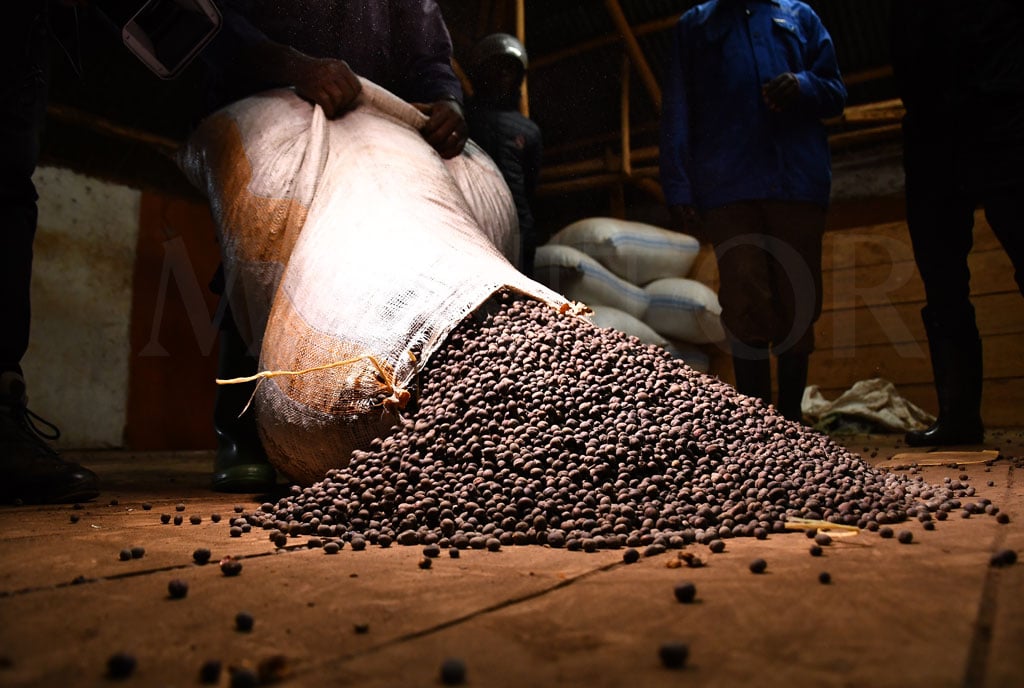Coffee boom: Ntale builds school from farming

Coffee is seen at a value addition centre in Kyotera District on May 23, 2024. PHOTO/MICHAEL KAKUMRIZI
What you need to know:
- Ntale advises farmers to seek technical advice before applying pesticides at the coffee gardens.
At Kiwangala Village, Kisekka Sub-county in Lwengo District, David Ntale, a coffee farmer is easily identified as ‘musomesa’ (teacher). Only a few residents realise that the school project is funded by the proceeds from the coffee garden.
“The coffee market price for the 2024 harvest season took us by surprise. We never anticipated the boom because the coffee yield at the gardens did not significantly change. The boom from the coffee proceeds is the reason for the ongoing construction works at the school,” he says.
A graduate of St Mathias Mbuye Agricultural College in Rakai, Ntale used his agricultural training to advance the family coffee farm, a 12-acre expanse yielding between 70-95 bags each season. As coffee prices surged unexpectedly in 2024, Ntale found himself in a unique position.
“From the semi-permanent structures, we shall soon shift the classes to the permanent classroom blocks with decent office and staff rooms for the teachers. We have also been able to purchase land and a car at Mustard Seed Nursery and Primary School from the good coffee proceeds,” he tells this publication.
Mr Ntale’s farming background has deep roots. Raised by coffee farmers, he grew up learning that hard work in the fields financed his schooling. Unlike several of the farmers at Kiwangala Village, who are still tied to traditional farming practices, Ntale’s coffee farm has well-nurtured coffee trees and green beans that will guarantee him another smile in December 2024. He dedicates more time to the gardens.
“A well-maintained coffee garden will fetch between eight and 12 bags of coffee beans. The changing climate calls for better farming practices that can be boosted by water irrigation. We also need to adapt to the mechanised farming practices to boost the coffee farm yields,” he says.
Ntale’s farming family background
After acquiring a certificate in General Agriculture at St Mathias Mbuye Agricultural College in Rakai District, Ntale dedicated his newly-acquired farm
knowledge to developing the home coffee farm. He did not want to waste the farm practices acquired from school since his family had land where he would practise farming.
“Whatever is on my coffee farm is representative of the farming family background and the training acquired at the agriculture college in Rakai District.
My parents were hard workers and ensured that the children learn by example,” he says.
Born to Peter Sserwadda Kabaganda
(father) and Ms Petralina Nakabugo of Kiwangala Parish, Kisekka Sub-county in Lwengo District, garden work was a must for all the children at home.
When he lost his father, Ntale embraced farming as a way to sustain himself and fund his aspirations. In 2020, with savings from coffee sales, he established Mustard Seed Nursery and Primary School, targeting children from underprivileged backgrounds—much like himself when he was sponsored by Compassion International to continue his education after his father’s death.
Working with organisations
As a trained farmer, Ntale chose to work with guidance from the Uganda Coffee Development Authority (UCDA) to ensure his coffee farm met the required farming standards.
“Several of our farmers are careless simply because they love shortcuts and will not bother to know about the breach of the coffee standards. When you work under supervision, you get to correct the mistakes. I was able to cement the coffee drying area with guidance from UCDA,” he says.
He also works closely with the Greater Masaka Agro-business Dealers Association (GREMADA) for training on disease control, market prices, and good arming practices.
Ntale believes that being a member of such farmer organisations partly adds value to his farm management skills.
“Farmers need to uphold standards,” Ntale says, noting that more than 6 percent of Uganda’s coffee is exported to the European Union, where quality egulations are stringent.
“I have looked at the guidelines including that which demands that the coffee is produced on Non deforested land. This is good for all parties. We need to protect our environment before we cry out loudly against climate change,” he says.
Ntale also advises the farmers to seek technical advice before applying pesticides at the coffee gardens.
Ntale also advocates for Ugandan coffee consumption to boost local demand. “Our coffee’s rich aroma is appreciated globally, yet it’s hardly consumed
here,” he laments, emphasising that a local market would create competition and add value to the crop.
Looking ahead, Ntale envisions a hybrid processing factory in Lwengo, where farmers can grade and process beans before they reach the market. He hopes this will unlock higher earnings for farmers in Kiwangala Village, many of whom still rely on traditional practices and struggle to maximise their yields.
Meanwhile, Uganda Coffee Development Authority’s September 2024 report ranks Italy as the top destination for Uganda’s coffee exports, with a 36.2
percent market share, followed by Germany (15.36 percent) and India.
Destination for coffee
Italy (36.2 percent market share) Germany (15.36 percent) India (8.6 percent).
Morocco (5.11 percent) Spain (5 percent) Sudan (3.49 percent) Netherlands (2.91 percent)Russia (2.83 percent) USA (2.36 percent)





